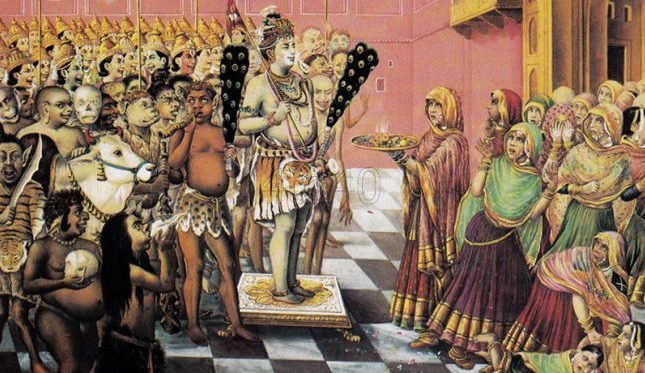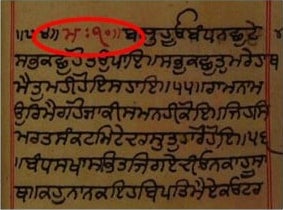GANA The Ganas, Gandharvas, Siddhas and saints…are engaged in uttering the infinite Praises of the Unapproachable and Unfathomab\'” Lord. (Devgandhari M. 5, p. 535) The Ganas and Gandharvas were emancipated through the remembrance of the Name of the Lord….. (Malar M. 3, p. 1259) Ganas or Gana-Devatas are the troops of deities. Nine classes of Ganas are Adityas, Viswe-devas, Vasus, Tushitas, Abhaswaras, Anilas, Maharajikas, Sadhyas and Rudras. These are inferior deities and are attendant upon god Shiva. The Lord of these Ganas is Ganesha (or Gana-pati), who, according to one legend, sprang from the scurf of the body of Parvati; and who is the god of wisdom and remover of obstacles.
References :
1. Kohli, Surindar Singh (ed), Dictionary of Mythological References in Guru Granth Sahib, 1993
Gana in Hindu Mythology and Quotes in Guru Granth Sahib
The term “Gana” holds deep significance in Hindu mythology, often referring to groups or attendants associated with divine beings. Most commonly linked to Lord Shiva, the Ganas are mystical entities who serve and surround the deity, representing a divine army or assembly. This concept of Gana symbolizes the cosmic order and the collective power of devotion and service, themes that resonate across spiritual traditions, including Sikhism as reflected in the Guru Granth Sahib.
Gana in Hindu Mythology
The Ganas are most famously known as the followers of Lord Shiva, led by his fierce and loyal commander, Nandi. These celestial attendants, diverse in form and nature, represent various aspects of creation, from the tangible to the mystical. The Ganas are said to reside in Kailasa, Lord Shiva’s abode, and participate in his cosmic dance, the Tandava, which signifies the cycles of creation, preservation, and destruction.
One of the most notable myths involving the Ganas is their defense of Lord Shiva’s honor in conflicts with other celestial beings. They also play an essential role in the stories of Ganesha, Lord Shiva’s elephant-headed son, showcasing their devotion and unity as a divine assembly.
Quotes in Guru Granth Sahib
While the Guru Granth Sahib may not specifically mention “Ganas,” it frequently uses metaphors of unity, service, and collective spiritual effort—principles that align with the symbolism of Ganas in Hindu mythology. The Sikh scripture emphasizes the importance of living in harmony with the divine order and participating collectively in service to the Creator.
For example:
- The Guru Granth Sahib highlights the importance of selfless service and devotion, akin to the role of Ganas serving their divine master.
- It underscores the idea that all beings, regardless of their nature or form, are part of the Divine creation and must work in unity to uphold righteousness.
The scripture teaches that true spirituality lies not only in individual effort but also in collective devotion and harmony with the Divine Will.
Philosophical Parallels
Ganas symbolize cosmic unity and divine service, ideas that transcend Hindu mythology and find echoes in the universal teachings of the Guru Granth Sahib. Their dedication and loyalty to Lord Shiva inspire reflections on the virtues of selflessness and community in the pursuit of spiritual enlightenment.




